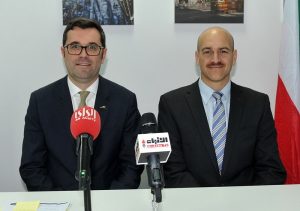Australian Ambassador to Kuwait, H.E. Jonathan Gilbert, said Australia remains Kuwait’s favorite food partner, with Australian products, fruits and vegetables increasingly being found in Kuwait supermarkets, and Australia continuing to play a key role in supplying wheat to Kuwait.
The ambassador was speaking during a media roundtable held on the occasion of the visit to Kuwait by Professor Neil Lazaro, a member of the Commonwealth Organization for Scientific and Industrial Research (CISRO). The professor was in Kuwait to attend a seminar on the effects of extreme weather organized by the Kuwait Institute for Scientific Research (KISR). In October, the CISRO and KISR had signed a Memorandum of Understanding (MoU) to work together on scientific matters.
Updating the attendees on Australia – Kuwait relations and the work done over the past year to strengthen bilateral cooperation and engagement, the ambassador pointed to high-level visits from both sides that had helped cement relations. He noted that former Australian foreign minister Julie Bishop had attended the Iraq Reconstruction Conference held in Kuwait in February. The conference highlighted the humanitarian leadership of Kuwait and constructive approach towards peace and stability in the region. He also disclosed that Australia and Kuwait had agreed to upgrade their relationship by holding biennial Senior Officials Talks, and that the opening talks would hopefully be held in Australia in 2019.
Regarding trade, the ambassador said that demand for Australian beef and lamb continued to grow and that after a pause over the summer months live sheep shipments have resumed with a greater focus on animal welfare. He added that total trade in food and agricultural exports in 2017-18 was about $300 million. Pointing out that the halt of export in live meat from Australia was not related to Kuwait as no violations of animal rights were committed, but was due to irregularities committed by the Australian exporting company. He revealed that the license of that company had been withdrawn by Australian authorities and the export license was subsequently assigned to another company. This changeover took some time, nevertheless the resumption of exports began with the first shipments in late November.
“Kuwait’s large investments in the oil and gas sector in Australia, as well as the energy and real estate infrastructure, are generating good returns for Kuwaiti investors. There are approximately 1,000 Kuwaiti students studying in Australia, and we hope this figure will increase further, given the positive experiences of young Kuwaitis who chose Australia because of high quality universities and safe and multicultural cities,” he stated.
“In the field of science and technology,” he explained that “Australia and Kuwait have a great place to cooperate and work together, and that his country is a natural partner for Kuwait in a number of scientific fields, including water management, renewable energy, dry land agriculture and aquaculture.” He added, “Australia has world-leading techniques in these areas, and this encourages Kuwait to be closely acquainted with them, especially as they fit the Executive Plan of the New Kuwait Vision of 2035.”
On the defense relations between the two countries, he said, “Australia and Kuwait still enjoy a close defense relationship supported by our participation in the coalition during the liberation of Kuwait in 1991 and the current cooperation in the International Coalition to fix a daunting “crisis”. We have a common commitment to strengthen regional security and cooperation, he said, stressing that “both countries are natural and reliable partners, and their warm relationships produce meaningful results for both.”
For his part, Professor Lazaro said, “Australia and Kuwait are weathering climate change, which is a global phenomenon that affects many countries around the world and requires a more united response.” He went on to explain the difference between the danger and the disaster, pointing out that the severe rains that hit Kuwait combines the danger and disaster because it negatively affected the infrastructure.

















